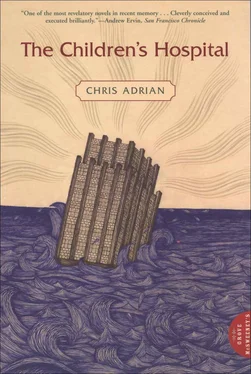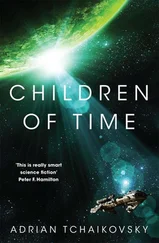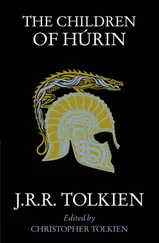“They’re fighting,” she said.
“I can hear,” he said. He’d turned off the TV and was reading in his bed. “They’ll stop.” He folded his book across his chest and opened the covers. She climbed in, and they listened to the shouts and occasional crashes. Sometimes they heard nothing, and sometimes just a single word. Their father was getting louder and louder, but their mother was loudest of all, and her voice, shrieking higher and higher, finally carried to the room as clear as if she was standing right in front of them.
Calvin moved his hands above the covers, lifting them high when his mother shouted, and low when they heard their father’s voice. “I’m conducting them,” he said. “I can make them do anything I want.”
“Shut up,” Jemma said quietly.
“Really,” he said. “And I started the fight, anyway. It was easy. I just told her I heard him talking to some nurse on the phone. They were making a date for dinner.”
“Shut up,” she said. “It’s not funny.”
“Not at all,” he agreed. “But it was so easy. I saw it in my imagination, and then I made it happen. If they hate each other enough, then it will lift me up. I’ll ride their misery right through Heaven.”
“You’re crazy,” Jemma said.
“I am going,” he said. “Don’t hold on too tight.”
“I’m coming too.”
“You don’t want to. It’s not going to be easy, you know. And the ride will be rough. A fountain of blood, and murder is the rocket’s tail.” He was quiet a moment, and then he shouted, “Hit her with a brick!”
“That’s disgusting.”
“What do you know?” he said, but he hugged her. “Blood calls to blood. If they spill blood, then the strangler will smell it, and come to us. He is coming, and I am going. Do you understand?”
“Shut up.”
“It’s not me, it’s them, calling him. Tell them to shut up.” So she shouted it at the door, not loud enough for them to hear over their own shouting all the way downstairs. But not long after that, they quieted.
“Tell me he’s not going to come,” Jemma said.
“I cannot tell a lie,” Calvin said, and turned on his side. She put her head on his back, using it as a pillow, but not sleeping, though she drifted, and almost fell asleep. For a few brief seconds she rode through the air above Hell in a monkey’s tricycle sidecar, throwing bananas down at the suffering nuns. Calvin sat up suddenly. “He’s here,” said. “Did you hear that?”
“No,” Jemma said.
“I heard his hand against the house.” He got out of the bed, slowly and quietly, and picked up his two biggest lacrosse trophies from his dresser. “Don’t scream until I start hitting him,” he said, and went to stand by the window.
“Okay,” Jemma whispered. She could barely hear herself. She sat up against the headboard, ready to scream, not sure if she could be anymore terrified as she waited and waited, until, impatient for the thing to finally happen, though she did not want it to happen, she imagined it. The Strangler would lift the window and come in one pale, fat hand at a time. She saw Calvin strike him once and twice, with either hand, right in the head, and saw him fall down to the carpet. Then she started screaming, as loud as she could, summoning her parents, who arrived almost instantly, dressed in pajamas and heavy boots, which they turned against the murderer, kicking him in the back and the chest and the head, while Calvin struck him, one-two, one-two, with his bloody trophies. And when he was as good and dead they would wave for Jemma to come to them, and she’d climb out of bed and walk over, and put one bare little foot upon his neck. “Calvin,” she whispered, her eyes shut tight now. “Tell him to hurry up.”

“Synfrosius,” Jemma said to Rob. “It’s a good name. I like that name!” They were lying in bed, getting ready to go out on their new rounds — superhero rounds, Rob called them. A week before there’d been a winnowing among the patients: the botch had raged mightily in a night, and in the course of twelve hours everyone in the PICU and the seven satellite ICUs was dead. Rob never ran away, like the majority of the staff, most just overwhelmed by a process that seemed to be declaring the futility of their work and their lives, some not just driven crazy by the abundance of suffering and death but stricken with the botch-madness, their brains scabbed with black ash and their minds a mess of fear and sadness and rage, so they wept as they ran, and punched in the face anyone who tried to stop them or comfort them. Rob was happy as he worked for the first time in weeks, glad to be fighting so hard but glad too because he could tell it was almost over. Jemma could feel it, from where she spent the night, groaning at the foot of their bed, reaching all over the hospital with her mind, as futile and useless as anyone else, experiencing the pain of the dying but not much succeeding in alleviating it. When the sun rose — another clear, beautiful day dawning over the water — all that was left of their last patient, Dr. Pudding, was three ribs and five kilos of ash (his bed weighed him every morning), and Rob and Dr. Tiller were the only two caretakers left in the unit.
“Lambchop,” said Rob. “I like that one too!” In the past two days he had not entirely been himself. He looked the same, and acted the same, and felt the same, and talking to him you would mostly not know that the botch had started to unfold in his brain, but more and more he would get excited about something like a silly name, or the fabric of their sheets, or the shape and texture of an asparagus newly condensed out of the replicator mist. And more and more Jemma spent all her time around him trying not to do her dry sobbing cry.
“That’s a nickname,” she said gently.
“Lambert Chopin Claflin-Dickens-Dickens-Claflin.”
“Those are all last names.”
“Vivian, then. Poor Vivian!” He didn’t seem to know he was sick, or that he was not acting entirely normal. Jemma kept expecting him to have a moment of high suspicion, when he hurried to the radiology suite to image his brain, but he never did.
“Poor Vivian,” Jemma said. “I’m sorry, Vivian.” Practice should probably have given her a better poker face by now, but she was grateful that Rob, even with his diminishing capacities, was facing away from her. “Sorry everybody,” she said, but she could not feel for everyone else the sort of regret she felt for failing to save Vivian, or miss them like she missed her, or like she missed the parts of Rob that were slipping slowly away.
“That’s a good one,” he said. “Or Pickie. But kids would probably make fun of him or her. Here comes Ass Pickie. There goes Pickie My Nose. Or how about Spanky?”
“Short for what?”
“Spankenmeier? Spankenbush? Spartacus?”
“I kind of like Spartacus.”
“Vivian,” said Rob. Something shifted in his voice, and she knew without even looking in his head that he was suddenly all there again. “Even if it’s a boy. There won’t be any name-calling in the new world.”
“Vivian what?”
“Just Vivian. Or, Vivian!”
“Supermodel Vivian,” Jemma said softly. The baby kicked her.
“Are you all right?” Rob asked, when she started.
“Just a kick,” she said. And then they were both quiet for a while. Jemma, always open to the rest of the hospital except when she actively hid from it, tried not to notice the terrible quiet.
The hospital was changed again, full of empty places and wild places, more than ever a home for survivors. The high death toll of the past week was not limited to the PICU. The Council was almost extinct, only Dr. Snood and Ishmael remaining of the four Friends, and only Dr. Tiller remaining of the extended twelve, though Cindy and her friends had organized themselves in a sort of alternate Council, which sometimes concurred with and sometimes resisted the senile efforts of the adults, who had stopped legislating and proclaiming. Dr. Tiller and Dr. Snood used the vestiges of their authority to organize protection for the sleeping children — no one younger than eighteen was awake now — and to organize the children themselves, more space allotted now for the medical dormitories than for the palliative adult wards.
Читать дальше













